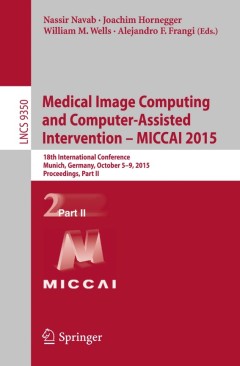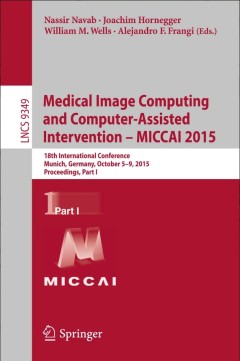Filter by

Medical Image Computing and Computer-Assisted Intervention -- MICCAI 2015 18t…
The three-volume set LNCS 9349, 9350, and 9351 constitutes the refereed proceedings of the 18th International Conference on Medical Image Computing and Computer-Assisted Intervention, MICCAI 2015, held in Munich, Germany, in October 2015. Based on rigorous peer reviews, the program committee carefully selected 263 revised papers from 810 submissions for presentation in three volumes. The papers…
- Edition
- 1
- ISBN/ISSN
- 1611-3349
- Collation
- XXVII, 720
- Series Title
- Lecture Notes in Computer Science
- Call Number
- -

Medical Image Computing and Computer-Assisted Intervention -- MICCAI 2015
The three-volume set LNCS 9349, 9350, and 9351 constitutes the refereed proceedings of the 18th International Conference on Medical Image Computing and Computer-Assisted Intervention, MICCAI 2015, held in Munich, Germany, in October 2015. Based on rigorous peer reviews, the program committee carefully selected 263 revised papers from 810 submissions for presentation in three volumes. The papers…
- Edition
- 1
- ISBN/ISSN
- 978-3-319-24553-9
- Collation
- XLVII, 740
- Series Title
- Lecture Notes in Computer Science
- Call Number
- -

Metodi matematici della Fisica
Questo libro trae la sua origine dagli appunti preparati per le lezioni di Metodi Matematici della Fisica tenute al Dipartimento di Fisica dell'Università di Pisa, e via via sistemati, raffinati e aggiornati nel corso di molti anni di insegnamento. L'intento generale è di fornire una presentazione per quanto possibile semplice e diretta dei metodi matematici basilari e rilevanti per la Fisica…
- Edition
- 1
- ISBN/ISSN
- 978-88-470-5683-1
- Collation
- X, 258
- Series Title
- UNITEXT for Physics
- Call Number
- -

Methods of Mathematical Modelling
This book presents mathematical modelling and the integrated process of formulating sets of equations to describe real-world problems. It describes methods for obtaining solutions of challenging differential equations stemming from problems in areas such as chemical reactions, population dynamics, mechanical systems, and fluid mechanics. Chapters 1 to 4 cover essential topics in ordinary dif…
- Edition
- 1
- ISBN/ISSN
- 978-3-319-23041-2
- Collation
- XVIII, 305
- Series Title
- Springer Undergraduate Mathematics Series
- Call Number
- -

Methods of Applied Mathematics with a Software Overview
This textbook, now in its second edition, provides students with a firm grasp of the fundamental notions and techniques of applied mathematics as well as the software skills to implement them. The text emphasizes the computational aspects of problem solving as well as the limitations and implicit assumptions inherent in the formal methods. Readers are also given a sense of the wide variety of p…
- Edition
- 1
- ISBN/ISSN
- 978-3-319-43369-1
- Collation
- XVII, 781
- Series Title
- Applied and Numerical Harmonic Analysis
- Call Number
- -

Mesoscopic Theories of Heat Transport in Nanosystems
This book presents generalized heat-conduction laws which, from a mesoscopic perspective, are relevant to new applications (especially in nanoscale heat transfer, nanoscale thermoelectric phenomena, and in diffusive-to-ballistic regime) and at the same time keep up with the pace of current microscopic research. The equations presented in the book are compatible with generalized formulations of …
- Edition
- 1
- ISBN/ISSN
- 978-3-319-27205-4
- Collation
- XIX, 170
- Series Title
- Series Title SEMA SIMAI Springer Series
- Call Number
- -

Metabonomics and Gut Microbiota in Nutrition and Disease
This book provides a comprehensive overview of metabonomics and gut microbiota research from molecular analysis to population-based global health considerations. The topics include the discussion of the applications in relation to metabonomics and gut microbiota in nutritional research, in health and disease and a review of future therapeutical, nutraceutical and clinical applications. It also …
- Edition
- 1
- ISBN/ISSN
- 978-1-4471-6538-5
- Collation
- XVI, 375
- Series Title
- Molecular and Integrative Toxicology
- Call Number
- -

Metabolic Influences on Risk for Tendon Disorders
This book will be of considerable interest to students, practitioners (Doctors, Physiotherapists, and other health care professionals), and researchers who deal with the complex structure of tendons and the need to effectively address tendon disorders. The book is divided into three sections: (1) Basic Biology and Biochemical Markers; (2) Metabolic Disorders; and (3) Novel Therapies. The first …
- Edition
- 1
- ISBN/ISSN
- 978-3-319-33941-2
- Collation
- IX, 304
- Series Title
- Advances in Experimental Medicine and Biology
- Call Number
- -

Membrane Potential Imaging in the Nervous System and Heart
This volume discusses membrane potential imaging in the nervous system and in the heart and modern optical recording technology. Additionally, it covers organic and genetically-encoded voltage-sensitive dyes; membrane potential imaging from individual neurons, brain slices, and brains in vivo; optical imaging of cardiac tissue and arrhythmias; bio-photonics modelling. This is an expanded and fu…
- Edition
- 1
- ISBN/ISSN
- 978-3-319-17640-6
- Collation
- XI, 516
- Series Title
- Advances in Experimental Medicine and Biology
- Call Number
- -

Medicine as a Scholarly Field: An Introduction
To me it is astonishing and to medicine actually shameful that it has taken up to year 2015 before there is a work in which the essence of medicine is described and discussed." -- J. Steurer, University of Zurich "[In this book], Miettinen beautifully elucidates the concepts and principles of knowledge-based diagnosis, and prognosis, within medicine. Now, after six decades of keen ob…
- Edition
- 1
- ISBN/ISSN
- 978-3-319-19011-2
- Collation
- XVI, 136
- Series Title
- Medicine as a Scholarly Field: An Introduction
- Call Number
- -
 Computer Science, Information & General Works
Computer Science, Information & General Works  Philosophy & Psychology
Philosophy & Psychology  Religion
Religion  Social Sciences
Social Sciences  Language
Language  Pure Science
Pure Science  Applied Sciences
Applied Sciences  Art & Recreation
Art & Recreation  Literature
Literature  History & Geography
History & Geography